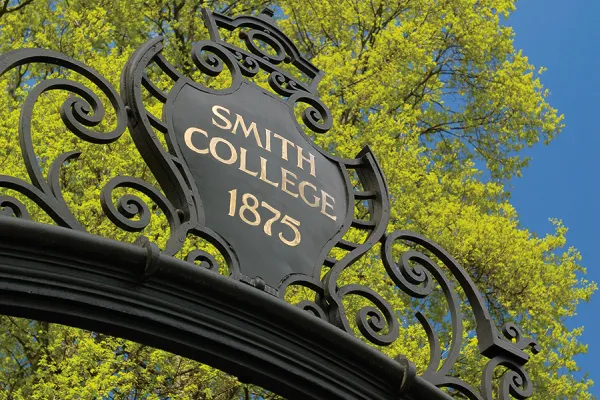Linking Academic Freedom to Inclusive Learning at Smith
News of Note

Published March 27, 2018
The Board of Trustees has unanimously approved a policy statement affirming Smith’s commitment to academic freedom and free expression, while connecting those issues more directly to the campus learning environment.
The result of 18 months of work by a Faculty Council committee that also included students, the statement is the first change to Smith’s academic freedom policy since 1992.
The effort did not arise out of any controversy at Smith, but rather “out of a desire to clarify both rights and responsibilities” related to free inquiry and expression, says Alice Hearst, professor of government and chair of the Academic Freedom and Inclusivity Committee.
“It’s an interesting political moment, with a lot of discussion happening nationally around academic freedom and free speech on college campuses,” Hearst notes. “It’s important for us to have a strong policy statement for when questions arise.”
The revised statement—which became effective as of the Trustees’ vote—asserts that the freedom to pursue intellectual and artistic inquiry “is of paramount value” at Smith and “pertains to students as well as faculty.”
The statement puts new emphasis on the links between academic freedom and Smith’s commitment to inclusivity, noting that such freedom is “fundamental for the protection of rights of the teacher in teaching and of the student to freedom in learning.”
The revised statement—which was shaped by longstanding policies of the American Association of University Professors—addresses the concepts of academic freedom and free speech separately, in order to provide clarity about how each of those principles operates at Smith.
Patricia DiBartolo, associate dean of the faculty and dean of academic development—and a member of the academic freedom committee—says she hopes the new statement will “help support our highest aspirations for our institution, creating a culture that allows our students to engage fully with ideas that are different from their own in the pursuit of learning.”
That framework is what led Katie Chong ’18, president of the Student Government Association, to become one of two students, with Maya Domeshek ’18, to join the committee last fall.
“You don’t usually hear about academic freedom and inclusive learning at the same time,” says Chong. “My first thought was, that’s interesting. Sign me up!”
In revising the academic freedom policy, committee members reviewed best practices in higher education, attended scholarly talks and hosted forums for Smith students to solicit their views.
At those forums, Chong says, “we talked about how wonderful it is that our professors here can do research on topics outside the norm.”
As for being exposed to difficult topics in the classroom, “students weren’t saying, ‘don’t teach it,’” Chong says, “but, ‘how can we make learning and teaching as inclusive as possible?’”
She hopes the new policy statement will help support faculty and students in achieving that goal through ongoing initiatives—including programming offered this year by the Sherrerd Center for Teaching and Learning.
“Our work on inclusive classrooms is not yet done,” Chong says. “It’s good to know the professors have our backs, and we have theirs.”